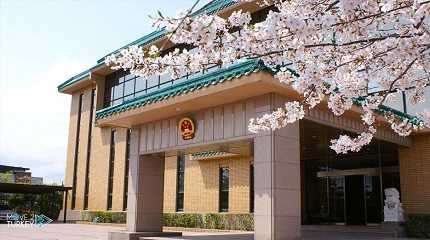
TOKYO, July 4 (Xinhua) -- The Chinese Embassy in Japan on Tuesday stated that the International Atomic Energy Agency (IAEA)'s safety report does not necessarily greenlight the Japanese government's plan to discharge nuclear-tainted water from the crippled Fukushima Daiichi nuclear plant into the Pacific Ocean this summer.
Following the ocean discharge decision announced in April 2021 and the official plan released in July 2022, the Japanese government repeatedly declared that it would not delay the discharge long before the IAEA task force completed the assessment and issued the final report, leaving the international community with a serious question mark over Japan's sincerity, the embassy told a press conference held in Tokyo.
The Chinese embassy pointed out that the IAEA, in terms of functional authorization, is mandated to promote the safe, secure and peaceful uses of nuclear technology, but is not the appropriate body to assess the long-term effects of nuclear-contaminated water on the marine environment and marine life's health.
Adding that Japan limited the mandate of the IAEA task force and does not accept evaluation on other disposal options, it stated the IAEA report cannot prove the legitimacy and legality of Japan's ocean discharge plan, nor can it absolve Japan of its moral responsibility and obligations under international law.
At the press conference, Chinese Ambassador to Japan Wu Jianghao called the Japanese government to revoke its wrong decision of dumping wastewater into the ocean, urging it to face up to the legitimate and reasonable concerns both at home and abroad and fulfill its obligations under international law.
Japan should seek disposal of nuclear-contaminated water in a scientific, safe, and transparent manner and accept strict international supervision, Wu added.
The embassy also elaborated on China's position on the huge risks that the discharge might bring to the global marine environment and human health, and Japan's deliberate confusion about the tritium content in contaminated water from the crippled power plant and the amount of tritium contained in the normal cooling water discharged from other nuclear power plants.
At the invitation of the Japanese Ministry of Foreign Affairs, the IAEA Director General Rafael Grossi started his four-day visit to Japan on Tuesday and met with Japanese Prime Minister Fumio Kishida to deliver the IAEA task force's final assessment report on the Advanced Liquid Processing System (ALPS) proposed in the government's discharge plan.
The Japanese government has been pushing to start dumping the contaminated water this summer, which has aroused strong opposition and doubts from domestic fishing groups, Pacific coastal areas, South Pacific island countries, and the overall international community.




